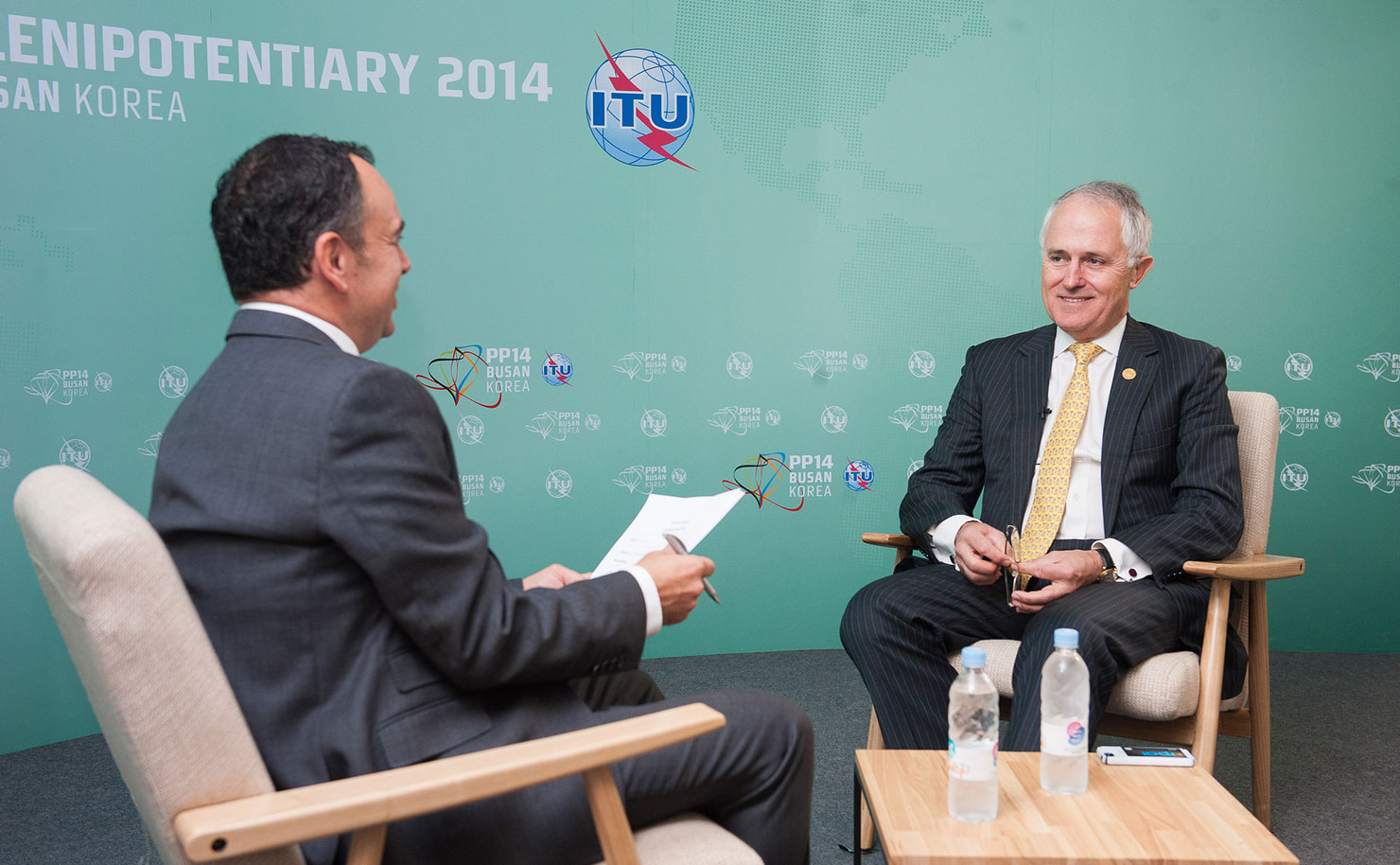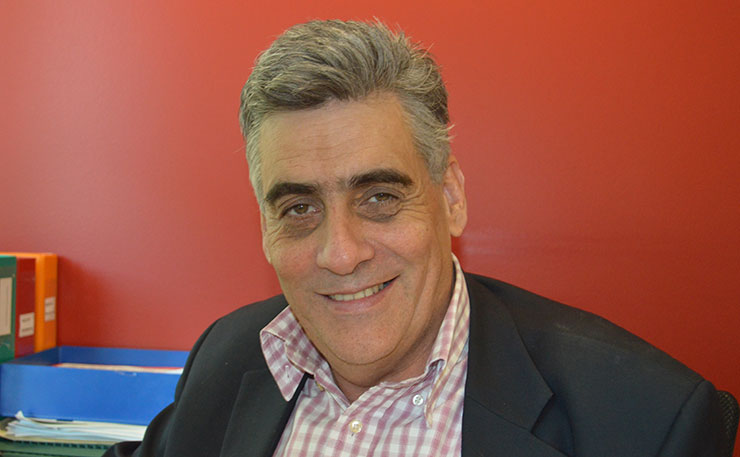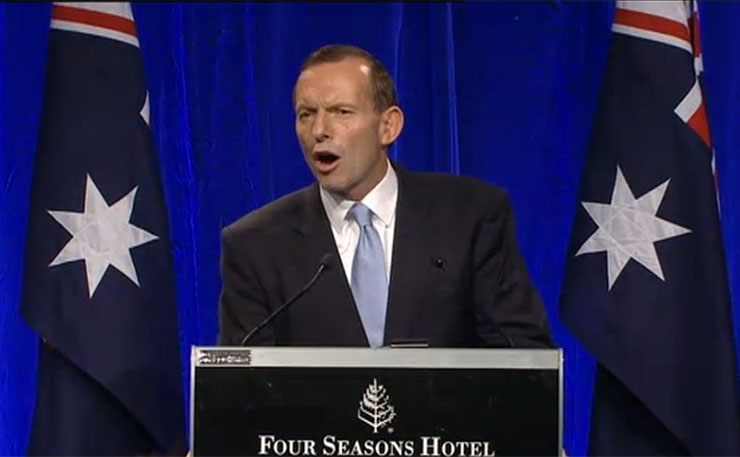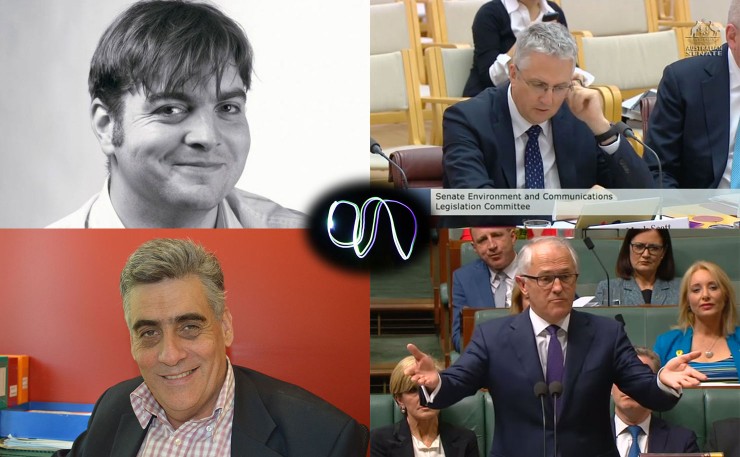ANALYSIS: Michael Brull weighs in on the controversy engulfing the ABC over its coverage around the National Broadband Network.
I suspect I wasn’t the only reader of the Nick Ross-Bruce Belsham saga to approach the story with something like a blank slate. As it happens, it seems that I am among the few involved in the media in some way who regard the “False Balance” story as significant. I think it’s worth setting out why.
On January 14 and 15, there were a slew of reports across media outlets about Nick Ross, and his appearance on Reddit. Ross used to work as technology editor at the ABC website, and resigned last week.
On Twitter, he announced that he could “potentially write about #NBN again” (NBN is the national broadband network, originally rolled out under the ALP federal government, then continued in a different form by the Coalition).
The ABC denied having gagged him. Yet for some readers, there was a kind of plausibility to this claim, as they had long suspected something of the sort.
Myriam Robin at Crikey observed that “It has long been speculated that Ross had been banned from writing about the NBN after 2013.”
The context is as follows.
In February 21, 2012 he wrote about the NBN, saying that it was poorly marketed by the ALP but otherwise a worthwhile policy.
In April 2012, he wrote critically about the Coalition’s plan for supposedly cheaper NBN.

On 14 June 2012, he wrote an article titled “NBN stats: Australia’s broadband future and why the Coalition’s alternative ‘won’t work’”.
In November 2012, he wrote “Huge doubts cast over Coalition’s ‘cheaper’ NBN alternative”.
At the end of November, he wrote two articles critical of the copper network the Coalition’s NBN plan would rely on.
In January 2013, he was impressed at the ALP’s NBN rollout.
In February, he wrote a very long, two-part analysis of the NBN, favourably comparing the ALP’s NBN plan to that of the Coalition.
Then, in July 2013, Ross wrote an article criticising the ALP’s advocacy for the NBN. The federal election happened on 7 September, 2013.
On 19 September, two more articles came out by Nick Ross, again criticising the Coalition’s NBN plan and favouring that of the ALP. Since then, I haven’t found him writing about the NBN at the ABC.
Prima facie, there does indeed seem to be a strong case that something happened. Nick Ross regularly wrote about the NBN with a particular perspective. Then he mostly stopped in early 2013, and entirely stopped in September. It is not clear what happened. However, readers can notice a few things about his articles.
Firstly, they are often long and carefully researched. They also took a particular point of view, critical of the Coalition’s policy, and supportive of the ALP’s.
Does this constitute bias? Well, it depends what one believes the purpose of journalism is, and what one believes constitutes bias.
In my view, bias is not presenting a particular position, but presenting a particular position which has been reached in a way less influenced than by the evidence than by inappropriate extrinsic factors.
HOUSE AD – NEW MATILDA IS A SMALL, INDEPENDENT MEDIA OUTLET. MOST OF OUR STAFF AND WRITERS ARE UNPAID. IF YOU WANT TO HELP SUPPORT INDEPENDENT MEDIA, YOU CAN DONATE A COUPLE OF DOLLARS TO OUR POZIBLE CAMPAIGN HERE OR SUBSCRIBE TO NEW MATILDA HERE.
For example, a journalist with links to the ALP might present a reasonable analysis of the ALP, but if those links influenced that journalist to provide excessively rosy coverage of the ALP, I would suggest that that coverage would be biased.
The mere fact reporting may be for or against the ALP, or anything else, in my view, does not constitute bias.
Ross has taken a strong position on the NBN. He is not entirely aligned with the ALP though. In July 2010, he wrote an article titled “Censorship: Labor’s hidden policy”.
Yet it seems his focus in writing as technology editor at the ABC was discussion of the NBN, from a particular standpoint.
The Australian repeatedly accused Ross of bias, and so did Shadow Communication Minister Malcolm Turnbull at the time. Turnbull said Ross’s “relentless NBN propaganda is an embarrassment to the ABC”.

The Australian also claimed that Ross had been “disciplined” at the ABC for failing to meet the ABC’s “standards of objective journalism”. Ross denied this on Twitter. Media Watch host Jonathan Holmes also denied this in its critical report on Ross, though it failed to identify its source for this claim. [Ed’s note: It subsequently emerged Ross was never disciplined for bias, nor did he ever had allegations of bias made against him by the ABC].
Yet though Holmes disputed that Ross had been disciplined, it did suggest that Ross’s clashes with Turnbull – in particular, a disagreement at a tech conference – had “gone too far”. Ross’s manager, ABC’s Bruce Belsham, was thus “caused” to “have a little chat with him”.
What did this “little chat” involve? Belsham said: “Contrary to some reports Nick has not been disciplined, but we did talk about the best approach in such situations, and about his NBN pieces in general.” Or in another account: “I have discussed with him the importance of providing a diversity of perspectives and the importance of analysis being underpinned by accurate information. He is aware of the need to ensure this.”
Prima facie, it would seem that both sides in this argument have a certain plausibility. Ross’s articles repeatedly criticised the Coalition, and praised the ALP. To some, this constitutes bias. Ross wrote regularly about the NBN, then suddenly stopped doing so for years, and then claimed he had been gagged.
It is in this context that New Matilda’s revelation of the meeting on May 28 2013 between Belsham and Ross can be considered. That meeting is not the “little chat” referenced above, and the transcript doesn’t quite show that Ross was gagged in the way that he has claimed. That is, Belsham at no point expressly instructs Ross that he is not allowed to criticise the Coalition’s NBN policy anymore. The transcript instead seems to suggest that Belsham wanted Ross to criticise the ALP’s NBN policy, so that he could continue criticising the Coalition, with an appearance of being a balanced commentator. In the meanwhile though, Belsham would hold publication of critiques of the Coalition’s NBN policy by Ross.
New Matilda editor Chris Graham – who I will disclose is my boss here, and a friend – has written that the point of the first article was not to prove that Ross had been gagged, though that is what previous media coverage had focused on. He also says he will soon “irrefutably” prove that Ross was gagged.
In a sense, Nick Ross and the NBN is an issue which already has partisans attached to every side. The Coalition and Murdoch press has long felt Nick Ross was biased, and so their supporters would support Belsham reigning in Ross. As indeed would the ABC’s Jonathan Holmes, who was in favour of Ross’s boss having a “little chat” with him.
However, there is another issue, which I think is significant. And that is the independence of the ABC, and state media generally, from political parties.

In my view, this is an important point, and one that has received no public discussion since the story came out. The principle that public broadcasters should be independent of the government is one that has received stirring support from none other than Prime Minister Malcolm Turnbull himself (as I have noted before – my regular readers will have to forgive me repeating myself).
Before becoming Prime Minister, as Communications Minister, Turnbull repeatedly issued stirring rhetoric about his values on this issue. In March 2013, he explained that “I am the minister that seeks to ensure that we have the freest and most diverse media we can possibly manage.” After all, “Those who think that this Liberal minister should be like Senator Conroy and seek to persecute or suborn or bully those who do not agree with him have got it completely wrong — they are wrong in principle and they are wrong in practice.”
This was a point he made repeatedly:
“I am not the Minister for right wing communications. I am not the Minister for communications that supports the Liberal Party. I think my predecessor at times felt that he was the Minister for Communications that favoured the Labor Party and sought to penalize those that weren’t so sympathetic to his cause. That is not the way I see my job.
My job is to ensure that our public broadcasters are free, are independent, do their job well, and above all from a financial point of view, do it efficiently. In other words there is the maximum broadcasting bang for the taxpayers’ buck. And then across the media scene I see my role as being one of promoting diversity and competition.”
Mr Turnbull explained that the ABC “often has news reports that will upset people in this building. It does, it will, it always should. The ABC’s job is to provide that accurate and impartial coverage of news and information across the nation and to do so without fear or favour.”
Mr Turnbull understood that in his position of power, he should be careful about how he used his influence. In November, he responded to the view that the “Minister is responsible for ensuring that the ABC’s news and current affairs is accurate and impartial.” He explained, “The Government does not and should never have any control over the news and current affairs of the ABC or SBS. Mr Putin’s model of media management is no more admirable than his foreign policy.”
Mr Turnbull understood that “The job of the press is to make governments and the powerful uncomfortable.” He knew that “we will grind our teeth at the injustices meted out to us by the newspapers of the day. We will rant and rage against the unfair broadcasts and criticisms of us. We know all that, but we know that that is vital to our democracy and we would never seek to restrict that freedom.”
And yet, when the ABC combined with the Guardian to run a story about Australian spying, Mr Turnbull rang the ABC to complain about their decision to publish the story. He said he didn’t admit “this publicly because you know what it’s like as Communications Minister, you don’t want to be lecturing the public broadcasters that you’re responsible for”. He did anyway.
Or there’s the case of SBS journalist Scott McIntyre, who tweeted unpatriotic comments about Anzac Day. Turnbull responded by immediately drawing them to the attention of the Managing Director of SBS, who promptly fired him. This time, Turnbull saw no freedom of speech issues.
And now there’s the case of Nick Ross. Turnbull publicly disputed his journalism, which I think is fine and natural for a politician. Yet it seems clear that Turnbull, or his office, effectively intimidated the ABC over Ross’s coverage of the NBN.
In terms of the political pressure, the transcript provides these quotes from Belsham
“I can’t let you publish something about the copper and then about all the terrific benefits of [INDECIPHERABLE] that’s not going to happen with the Coalition, because basically, the world, the Turnbull camp and my superiors are going to come down on me like a tonne of bricks. We’ve got to give you some kind of insurance policy, you know. An insurance policy is an article where you are hard-headed about something to do with the NBN’s failings, or, you know, potential failings.”
And
“Yeah look, I like the copper piece and I would like to publish it, but I’m just saying, before I can let you do that, so I don’t have screams from the 14th floor, and, and so you don’t go through the same crisis that you went through a few weeks ago [a reference to public attacks directed against Ross by Malcolm Turnbull and media], we need to give ourselves, and say ‘look, this guy is prepared to be critical of some aspects of the NBN, he’s written this tough article about X’.”
It should also be noted: Belsham explicitly denied that it was the substance of the articles that was at issue. For example, “I don’t have anything per se in terms of objections to the piece”, “I’d love for you to be able to publish that”, “I like the copper piece and I would like to publish it”.
Whilst some may be critical of Belsham, my view of his conduct is more mixed. I believe he was put in a difficult situation, and tried to find a workable compromise. Everyone knew that Tony Abbott was going to win the next Federal Election, and that he was a hardline critic of the ABC. Turnbull was a relative moderate. Even in 2014 he launched the Parliamentary Friends of the ABC, created to “advocate for a well-resourced and independent ABC.”
Turnbull reportedly spoke “passionately” on the subject, though, for some reason, his speech isn’t reproduced on his website. Yet the Coalition duly cut $254 million from the ABC budget in 2014. That is, as soon as they could, though Abbott went to the election promising no cuts.
Belsham is clearly no idiot, and neither are the people he answers to at the ABC. Belsham acknowledged that, “I’m not asking you to invent something”, but this was a question of “real politik”. Those cuts apparently meant the loss of 190 jobs. Belsham had to balance his responsibilities, with providing an income to those people, and thousands more.
Yet if Belsham’s behaviour can be understood, if not necessarily commended, the situation at the ABC cries out for comment and action. It is appalling that the ABC should refuse to run an article critical of the Coalition purely because of political pressure, and because an election was looming.
Conservatives routinely trash the ABC as biased. If it was revealed that the ABC refused to run an article critical of the ALP because the ALP was soon going to be elected, does anyone doubt what the reaction from the Murdoch press would be?

Indeed, Turnbull himself had provided the words to express appropriate disgust at his own office’s conduct. Remember, he promised to not be the “Minister for right wing communications”, or for “communications that support the Liberal Party”, and criticised his predecessor for being that type of Communications Minister.
He knew the ABC would have news reports that will “upset” politicians: “it always should”. The “job of the press is to make governments and the powerful uncomfortable”. We “will grind our teeth at the injustices meted out to us by the newspapers of the day. We will rant and rage against the unfair broadcasts and criticisms of us. We know all that, but we know that that is vital to our democracy and we would never seek to restrict that freedom.”
If this happens with the Liberal Party, there is no reason to suspect it’s different with the ALP. We spend over a billion dollars every year on the ABC. Yet it appears to have very little independence, if it can’t criticise policies heading into an election.
If we are going to have a valuable public broadcaster, we need one that can report on the news without fear or favour. We need one that can antagonise governments and politicians without worrying about repercussions down the line from their impending bosses.
And rather than the silly pretence of objectivity that simply means bland, safe and unthreatening reporting, the ABC should foster ideological heterogeneity, so that someone like Nick Ross doesn’t stand out.
HOUSE AD – NEW MATILDA IS A SMALL, INDEPENDENT MEDIA OUTLET. MOST OF OUR STAFF AND WRITERS ARE UNPAID. IF YOU WANT TO HELP SUPPORT INDEPENDENT MEDIA, YOU CAN DONATE A COUPLE OF DOLLARS TO OUR POZIBLE CAMPAIGN HERE OR SUBSCRIBE TO NEW MATILDA HERE.
Donate To New Matilda
New Matilda is a small, independent media outlet. We survive through reader contributions, and never losing a lawsuit. If you got something from this article, giving something back helps us to continue speaking truth to power. Every little bit counts.





